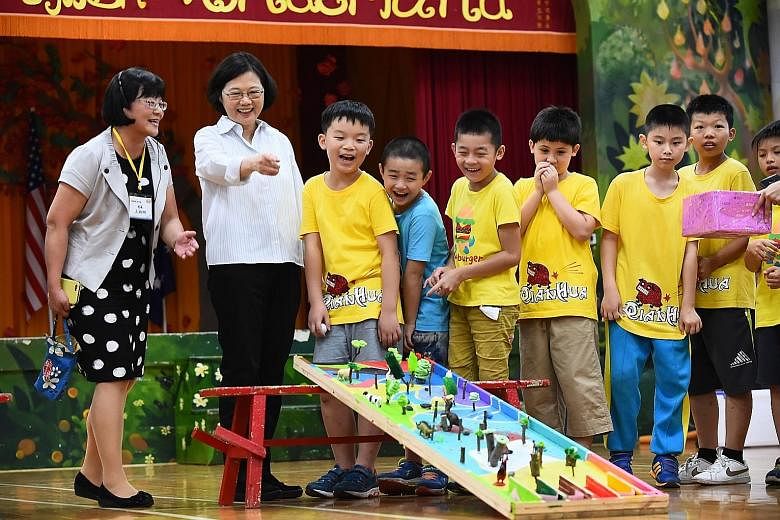Brows furrowed and lips stretched into an exhausted grimace masquerading as a smile, Taiwan's new President Tsai Ing-wen strides in to greet United States Assistant Secretary of Commerce Marcus Jadotte.
Reading in Mandarin from a statement, she stammers as she says: "I'm very happy to meet, after my inauguration, this high-level delegation from the US."
"I understand that this is our..."
She stops. Six long seconds of awkward silence follow as she tries to collect her thoughts.
She then apologises, somewhat incoherently, in English: "I have a problem of saying the Chinese language."
The clip of Ms Tsai's uncharacteristic fumble on Wednesday, broadcast by Taiwan television station TVBS, has since been met with a mix of empathy and derision from the Taiwanese public.
"Jiayou," some write on Facebook, encouraging her to keep going.
Others are far less charitable. "It's been just five days. You said you were ready (to take charge). You are indeed kong xin cai," says Tainan resident Percy Cheung, in reference to Ms Tsai's nickname by detractors.
The Chinese term for kangkong is a pun on her surname and translates literally into "empty heart vegetable". It has been used by critics to deride what they deem to be her deliberate vagueness in policies.
Ms Tsai later said she is unaccustomed to reading from statements when receiving foreign dignitaries.
It has certainly been quite a week for the 59-year-old, inaugurated as Taiwan's fourth elected President on May 20.
All new leaders have it tough, but Ms Tsai probably comes under more pressure from disparate fronts than most.
She has had her inauguration speech analysed to the nth degree both at home and abroad, been judged by Beijing as an inept student who has submitted an "incomplete test answer", and was psychoanalysed in a lengthy essay by Chinese analyst Wang Weixing as "extreme and emotional" - because she is single and childless.
Her administration has also made some striking - and controversial - decisions.
On the very first day at work, it announced that it was dropping charges against the Sunflower movement students and activists who had charged into and occupied the legislative building two years ago to protest the ratification of a service trade pact with China.
While this angered the blue camp with former premier Jiang Yi-huah lambasting it as a decision that "makes no distinction between right and wrong", new Premier Lin Chuan argues that the students' cause had become a "common consensus of society" .
The new administration also makes clear that a reorientation towards Japan is in the wings.
It announced that it is setting up a dialogue channel with Tokyo for settling maritime disputes, including over Japan's seizure of a Taiwanese fishing boat when it sailed near the Japanese reef of Okinotori last month.
Some, such as former National Security Council deputy secretary- general Parris Chang from Ms Tsai's Democratic Progressive Party (DPP), applaud the move, which Mr Chang says is what key ally, the US, "will also like to see".
At the same time, the move will likely entrench suspicions in Beijing that she is a "Japanophile" - as accused by Mr Wang, who is from the Association of Relations across the Taiwan Straits (Arats), China's semi-official organisation that conducts technical negotiations with Taiwan.
Gaining less public attention was a small tweak to a rendition of Taiwan's official name.
In an internal policy memo, the new Cabinet made references to "the Republic of China Taiwan".
This is a small but notable change, says Tamkang University analyst Chen I-hsin. Previous official documents made reference to Republic of China or Republic of China (Taiwan).
Without the parenthesis, the emphasis now appears to be on Taiwan - in what Professor Chen characterises as a "likely trial balloon for reactions to a step towards soft independence".
Yet, Ms Tsai has also taken some mollifying moves towards Beijing in the other direction. Her inauguration speech was judged by many to be a well-crafted one. She did not mention a "one China" principle but offered minor concessions that managed to fob off - for now - a thunderous response from Beijing.
Its reaction was telling. Her speech was an "incomplete test paper". While focus is on its assessment that she has been found wanting, the subtext is also clear: Beijing is willing to wait for her to submit the "complete" essay.
So the President has won herself some time. But how long will China wait? Already, it is threatening to sever the 23 cross-strait economic pacts inked during Mr Ma Ying-jeou's time, as well as regular dialogue mechanisms.
The widely-panned essay by Mr Wang also shows a paucity of understanding of Ms Tsai - and Taiwan - among certain quarters of Beijing, raising concerns about the odds of policy miscalculations.
Meanwhile, Ms Tsai will have to tread carefully with her domestic constituents, who have high expectations for her especially in improving the economy, and want her to keep a distance from China - without cross-strait relations imploding altogether.
The multiple developments presage the delicate balancing acts that the Taiwan President has to manage in her four-year term.
At the Cabinet's first meeting, Premier Lin said there will be no "adjustment period" for the government.
No wonder Ms Tsai is tired.

